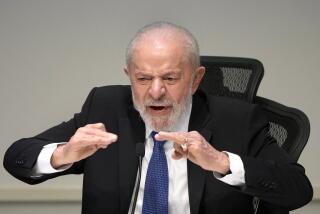Cardoso Gets Brazil Presidency, Polls Show : Election: Man credited with halting runaway inflation apparently avoids a runoff.
- Share via
SAO PAULO, Brazil — Fernando Henrique Cardoso, the man credited with halting at least for now Brazil’s decade-long runaway inflation, Monday became the nation’s second democratically elected president in the past 31 years, according to exit polls.
The 63-year-old sociologist and former senator captured more than 50% of the valid vote, post-election voter surveys reported, and apparently avoided a November runoff with runner-up Luis Inacio (Lula) da Silva, a former union leader and candidate of the socialist Workers’ Party.
In Brazil, voting is mandatory for everybody between the ages of 18 and 70, but voters can cast a blank or a spoiled ballot.
A Gallup poll of voters at election sites reported that Cardoso captured 45.1% of the total vote compared to 42.1% of the vote for all the other candidates combined. Twelve percent of the electorate cast a blank vote.
According to Brazil’s Ibope poll, Cardoso captured 46% of the vote compared to 39% for the other candidates, and 15% of the electorate cast a blank vote.
The first official tallies are not expected until today. Final official election results will probably not be complete for at least five days, election officials said.
Members of the Workers’ Party, which is headed by Da Silva--who is universally know as Lula--refused to concede the election, holding onto the slim hope that their candidate will force a Nov. 15 runoff between the two leading candidates. A runoff would be necessary if no candidate receives a majority.
“We believe there will be a second round,” said Marcos Aurelio Garcia, a ranking party official and senior aide to Lula. “One way that we can ensure that is for our members to go out and oversee the counting of the votes tomorrow morning.”
Cardoso, author, former ambassador to the United States and a brief political exile during the country’s 21-year military dictatorship, catapulted to the front of a field of eight presidential hopefuls atop a wave of support for an economic plan he devised while serving earlier this year as the country’s finance minister.
Following the commencement in July of Cardoso’s “Plano Real,” which included the introduction of a new currency, inflation dropped from 50% in June to 6% in July and less than 1% in August.
As inflation dropped and the nation’s economy stabilized, voters turned toward Cardoso and away from Lula, who had built a sizable early lead based on voter dissatisfaction and promises of radical social reform.
“The real plan is one that (Cardoso) developed,” said student Virginia Goas, 20, after casting her vote for Cardoso at a Sao Paulo election site. “By voting for him, it guarantees that the plan will continue to work.”
If the exit polls are accurate, Cardoso will be the second popularly elected president since 1963, when a military dictatorship took power and controlled the country until 1984, when Jose Sarney was installed as president through a parliamentary process.
Fernando Collor de Mello became president in 1989 following national elections, but was impeached three years later. Monday’s elections were the biggest in Brazil’s history, with voters choosing a new president, hundreds of congressmen, two-thirds of the Senate, all 27 governors and 1,500 state legislators.
Monday was declared a national holiday to ensure that the nation’s 94 million registered voters had time to go to the balloting sites.
In major cities like Rio de Janeiro, Sao Paulo, Salvador and Belo Horizonte, voters waded to the polls through streets littered with election pamphlets, posters and papers that were either distributed by hand, thrown to pedestrians from passing cars or rained down like confetti upon the electorate from office buildings during the final days of the campaign.
“This campaign has been really great” in terms of avoiding mud-slinging, Cardoso, candidate of the Brazilian Social Democratic Party, told reporters in Sao Paulo as he headed to cast his vote. Cardoso left the city Monday afternoon for a ranch in the interior of the state. Aides said he will hold a news conference on the election later this week in Brasilia, the nation’s capital.
Lula, 48, however, denounced the election as “illegitimate,” after casting his vote in an industrial suburb of Sao Paulo. Cardoso, he said, was boosted by big business, the media, the government of President Itamar Franco and the distribution of fraudulent sample ballots.
More than 12 million incorrect sample ballots used to educate voters prior to the election were found in the possession of Cardoso’s Social Democratic Party and in the offices of two other parties with which Cardoso has formed alliances during his presidential campaign.
On the ballots, Lula’s name appeared third instead of fourth, as it appears on the official ballot. Lula said the incorrect position would confuse millions of illiterate voters who had been taught to vote according to the position of the candidate’s name on the official ballot.
More to Read
Sign up for Essential California
The most important California stories and recommendations in your inbox every morning.
You may occasionally receive promotional content from the Los Angeles Times.











